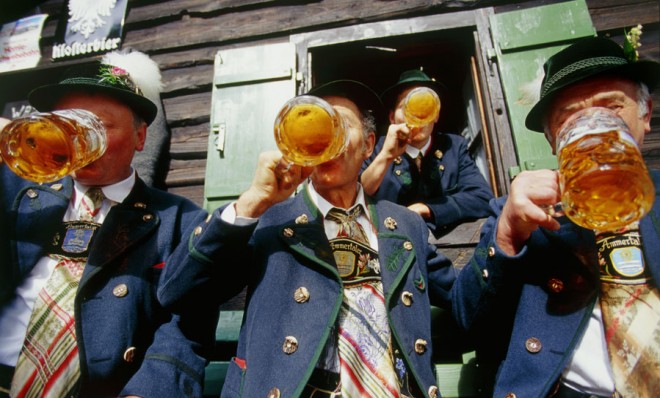Could fracking ruin Germany's beer?
The country's brewers want Berlin to hefe-weizen up and reconsider a proposed fracking law


A free daily email with the biggest news stories of the day – and the best features from TheWeek.com
You are now subscribed
Your newsletter sign-up was successful
Water, malt, hops. For centuries, German law prohibited any other substances from going into the nation's beers (this was before they knew about yeast).
Yet now, the country's brewers fret that their brews could wind up containing a host of unknown chemicals should the government move ahead with a proposed fracking law.
The Brauer-Bund beer association has asked the government to forestall proposed fracking legislation until it can ensure the practice won't contaminate groundwater used for brewing. The group is concerned that hydraulic fracturing, which involves blasting water and a slurry of undisclosed chemicals into the ground to obtain natural gas from shale deposits, could pollute the private wells used by many of the nation's brewers.
The Week
Escape your echo chamber. Get the facts behind the news, plus analysis from multiple perspectives.

Sign up for The Week's Free Newsletters
From our morning news briefing to a weekly Good News Newsletter, get the best of The Week delivered directly to your inbox.
From our morning news briefing to a weekly Good News Newsletter, get the best of The Week delivered directly to your inbox.
"You cannot be sure that the water won't be polluted by chemicals so we have urged the government to carry out more research before it goes ahead with a fracking law," a spokesperson for the group told the Telegraph.
With fracking becoming a more popular method of energy extraction worldwide, German Chancellor Angela Merkel's government has been working on legislation to expand the practice. The country currently allows test drilling in some places, just not near reservoirs of drinking water and other sensitive areas.
However, the brewers worry that the legislation won't go far enough in protecting their water, which, if sullied, could inadvertently result in the violation of a centuries-old beer purity law, called the Reinheitsgebot.
That law, passed way back in the 15th century, is technically no longer on the books; a European court struck it down in the 1980s. Yet many brewers still consider it a source of pride to adhere to those ancient guidelines, hence the association's fear that fracking would endanger their "absolutely pure beer."
A free daily email with the biggest news stories of the day – and the best features from TheWeek.com
Germany, home to some 1,250 breweries and 5,000 different brands of beer, isn't alone. American breweries have also expressed concern that fracking could taint their ales and lagers.
That's because, purity laws aside, brewers are water fanatics. Homebrewers will go to incredible lengths to reproduce the mineral content of water supplies from certain brewing regions in attempts to clone world-famous beers. Should mysterious chemicals seep into the mix, it could completely throw off the chemical processes involved in brewing, and thus dramatically alter a beer's taste and appearance.
And if you thought it was just beer snobs who are up in arms about this, think again. Brauer-Bund represents AB InBev, makers of Budweiser and other drinks of dubious quality. If Budweiser is concerned about how fracking might make its beer taste, imagine how craft brewers must feel?
Jon Terbush is an associate editor at TheWeek.com covering politics, sports, and other things he finds interesting. He has previously written for Talking Points Memo, Raw Story, and Business Insider.
-
 5 blacked out cartoons about the Epstein file redactions
5 blacked out cartoons about the Epstein file redactionsCartoons Artists take on hidden identities, a censored presidential seal, and more
-
 How Democrats are turning DOJ lemons into partisan lemonade
How Democrats are turning DOJ lemons into partisan lemonadeTODAY’S BIG QUESTION As the Trump administration continues to try — and fail — at indicting its political enemies, Democratic lawmakers have begun seizing the moment for themselves
-
 ICE’s new targets post-Minnesota retreat
ICE’s new targets post-Minnesota retreatIn the Spotlight Several cities are reportedly on ICE’s list for immigration crackdowns
